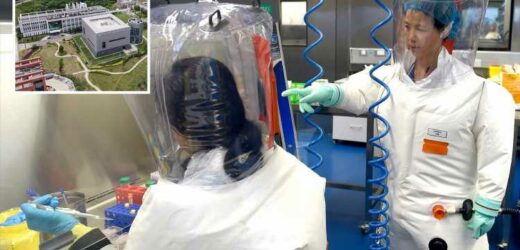AN infection of a Taiwanese researcher has made the theory Covid came from a Wuhan lab leak “plausible,” according to experts.
The lab worker, who tested positive on Thursday for the Delta variant, had been bitten by a mouse infected with the coronavirus for experiments carried out at a high-biosecurity facility in the island’s capital Taipei.
The woman, who is aged in her 20s and double-vaccinated, has not travelled abroad recently.
Taiwan has had no domestic transmission for more than a month.
Health investigators believe she caught the virus while working at the Academia Sinica, Taiwan’s leading institute.
If confirmed, it would strengthen the theory the global pandemic was caused by a similar lab leak at the Wuhan Institute of Virology (WIV) in China.
“If the lab worker is confirmed to have been infected at her workplace, then this will add credibility to the lab leak theory,” said Yanzhong Huang, a Chinese public health expert at the Council on Foreign Relations think tank.
Most read in The Sun
FRESH PAGE Gavin & Stacey's Joanna Page welcomes baby girl and reveals quirky name
Fury as minister refuses to guarantee schools will open in January
I'm A Celeb's David Ginola in feud with Ant & Dec before being axed by fans
Lindelof off in worrying scenes after suffering chest pains vs Norwich
“This case comes as we have reached an impasse on the origins probe for Covid-19, with no progress on establishing whether the outbreak was the result of a natural spillover from animals or a lab leak.”
The Wuhan lab is just a few miles from the wet market associated with a number of early cases of Covid.
Shi Zhengli, a coronavirus expert who worked at WIV and is known at the “bat woman,” used mice to test the impact of modified bat viruses in “gain of function” experiments.
While some academics champion the genetic adaptation of animal pathogens as valuable research to tackle future pandemics the practice is banned in a number of countries due to the dangers involved, such as the escape of deadly virus.
Both British and US government investigations have concluded the lab leak theory is plausible.
Read our Omicron live blog for the latest updates
It is thought a researcher may have become infected in an accident and then spread the disease in the community after leaving work – as it is feared the Taiwan lab worker may have done.
China has fiercely rejected the theory and blocked international investigations into the source of the coronavirus.
US biologist and biosafety expert Richard Ebright has noted human infections occurred at labs in Taiwan, Singapore and China in 2003 and 2004 during research into the Sara coronavirus.
“The incidents underscore that laboratory accidents, including those that result in infection of a laboratory worker and transmission of infection from the laboratory worker to the general public, occur,” he said.
“It is eminently plausible that a Wuhan laboratory worker handling Sars-related coronaviruses was infected and then transmitted the infection to the general public, sparking the pandemic.”
The Taiwanese lab worker told officials she was first bitten by an infected lab mouse on October 15 but a test gave a negative result.
She was then bitten by an infected mouse for the second time on November 19, which raised concerns over safety protocols, but took no test.
“We believe the possibility of infection from the workplace is higher because we have zero confirmed infections in the community,” Chen Shih-chung, Taiwan’s health minister, said.
“As for inside the workplace, whether it is in the office or laboratory, we determined the laboratory has a higher risk. But whether the infection is from the bite or the environment, we need to investigate further.”
The woman is said to have taken buses and trains as well as going out shopping and dining out for several days while feeling ill but before testing positive, The Times reports.
The infection of the woman has raised fears of a new wave of infection in a country that has been praised for its handling of the pandemic.
Taiwan has kept strict border controls and imposed a mandatory two-week quarantine for all arrivals, while easing domestic restrictions in recent months.
Early tests of 138 close contacts showed 123 were negative with 15 still pending.
The situation of a further 328 workers at Academia Sinica is being monitored but no positive cases have been reported.
Three domestic outbreaks in the past 12 months have been linked to pilots and flight crew returning from abroad.
Source: Read Full Article










